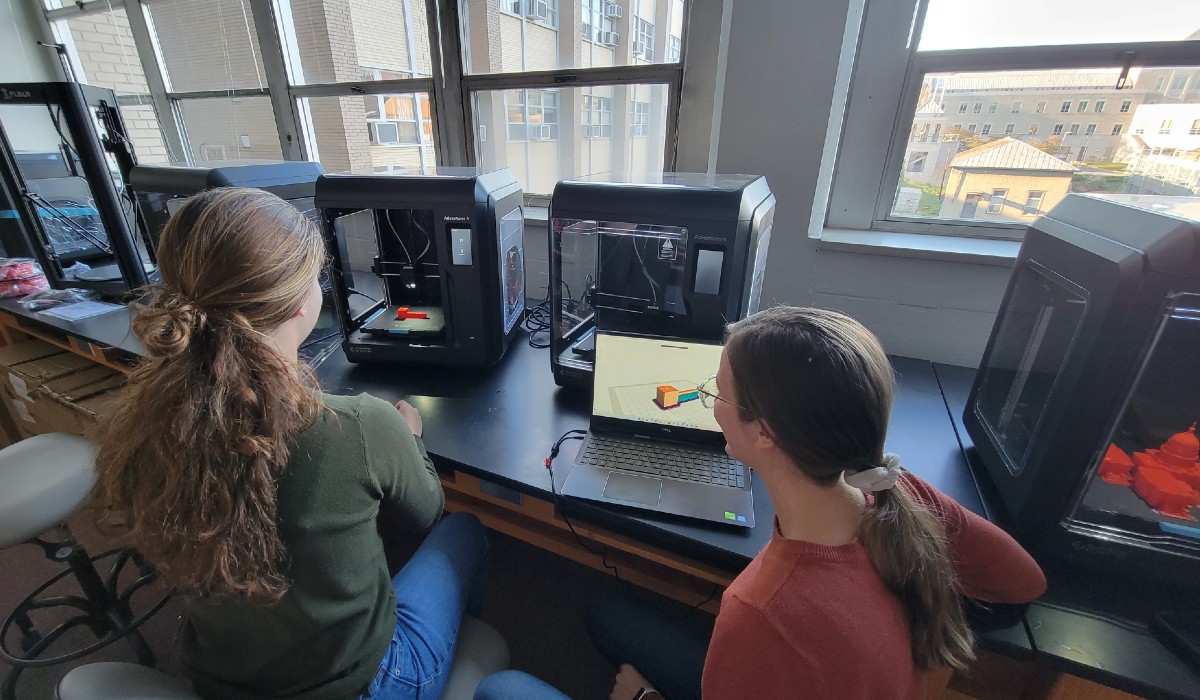The Biomedical Engineering department offers a Master of Science (M.S.) degree in biomedical engineering. We offer a variety of subplans with recommended focus areas, listed below.
Masters Degree General Requirements
The minimum requirement for the master's degree are the successful completion of an approved program of study consisting of 30 graduate credits (10 courses) with a cumulative GPA of at least 3.0. Two options are available for the M.S. study:
- Non-Thesis Option: A coursework (or non-thesis) masters is obtained whereby the minimum 30 credits are based upon approved graduate coursework only.
- Thesis Option: A thesis masters is obtained whereby the minimum 30 credits are based upon completion of approved graduate coursework (8 courses) in combination with submission of a research thesis (equivalent to 2 courses). A written thesis has to be approved by the major advisor (BE faculty member) and a reader. The selection of courses and thesis topics are conducted with the approval of a faculty advisor.
The selection of courses and thesis topics are conducted with the approval of a faculty advisor.
Standard Coursework M.S. Requirements
- 2 core engineering courses (ENGR 516, ENGR 518 or ENGR 520),
- 5 BE courses,
- 3 other courses selected from engineering and/or biomedical-related graduate level courses.
Standard Thesis M.S. Requirements
- 2 core engineering courses
- 4 BE courses
- 2 other course selected from engineering and/or biologically-related graduate level courses
- 2 semesters of thesis research courses (ENGR 696/696B).
M.S. in Biomedical Engineering, Biotechnology Subplan
- 2 core engineering courses
- 4 BE courses, recommend: BE 501 Biomaterials, BE 513 Bioinstrumentation, BE 527 Cell and Tissue Engineering, and 1 more BE 500+ level
- 4 BIOL courses, recommend: BIOL 554 Biological Chemistry, BIOL 579 Principles and Practice of Biotechnology, 2 more BIOL 500+ level courses such as: Molecular Genetics and Recombinant DNA, Cell Structure and Function, Gene Organization and Expression, Comparative Metabolism, Regulatory Processes for Domestic and Global Biotechnology Products, Essentials of Biotechnology Project Management, Entrepreneurial Biotechnology, Bioinformatics, Biophysics, Developmental Biology, Molecular Diagnostics, Immunology, Signal Transduction, Virology
M.S. in Biomedical Engineering, Computational Bioscience Subplan
- 2 core engineering courses
- 4 BE courses, recommend: BE 513 Bioinstrumentation, BE 528 Rehabilitation Engineering, BE 581 Medical Imaging OR BE 514 Biomedical Optics, and 1 more BE 500+ level
- 4 CS courses, recommend: CSC 584 Introduction to Machine Learning, CSC 587 Introduction to Medical Image Computing, and 2 more CS 500+ level including Intro to Data Analysis, Intro to Secure Computing, Applications of Data Analytics and Development, Introduction to Data Mining, Distributed Computing and Networking, Data Communication Networks, Cyberattack Methodologies and Vulnerability Analysis, Introduction to Computer Vision, Introduction to Information Privacy and Security
M.S. in Biomedical Engineering, Tissue Engineering Subplan
- 2 core engineering courses
- 5 BE courses, recommend: BE 501, Biomaterials; BE 514, Biomedical Optics; BE 527 Cell and Tissue Engineering; 2 more BE 500+ levels
- 3 other 500+ level courses, recommend in BIOL, ME, or MSE: Cell Structure and Function, Gene Organization and Expression, Developmental Biology (BIOL); Finite Elements, Microfluidics & Lab on a Chip (ME); Introduction to 3D-Printing Science and Engineering, Mechanical Properties of Materials (MSE).
M.S. in Biomedical Engineering, Rehabilitation Engineering Subplan
- 2 core engineering courses
- 5 BE courses, recommend: BE 513 Bioinstrumentation; BE 528 Rehabilitation Engineering; BE 533 Brain-computer Interfaces for Neuro-rehabilitation; and two other BE 500+ level courses
- 3 other 500+ level courses, recommend in EE, ME, or CS: EE 547 Artificial Intelligence, EE 576 Introduction to Robotics, EE 584 Introduction to Machine Learning; ME 503 Structural Mechanics, ME 504 Introduction to Finite Elements, ME 510 Modern Control Systems; CS 527 Fundamentals of Neural Networks, CSC 529 Introduction to Computer Vision, CSC 530 Introduction to Data Analysis, CSC 545 Introduction to Data Mining
M.S. in Biomedical Engineering, Biomaterials Subplan
- 2 core engineering courses
- 5 BE courses, recommend: BE 501, Biomaterials; BE 514, Biomedical Optics; BE 527 Cell and Tissue Engineering; 2 more BE 500+ levels
- 3 other 500+ level courses, recommend in EE, ME, or CS: ME 503 Structural Mechanics, ME 504 Introduction to Finite Elements, ME 547 Intermediate Thermodynamics, ME 581 Microfluidics and Lab on a Chip; CS 527 Fundamentals of Neural Networks, CSC 529 Introduction to Computer Vision, CSC 530 Introduction to Data Analysis, CSC 545 Introduction to Data Mining
M.S. in Biomedical Engineering, Bioinstrumentation Subplan
- 2 core engineering courses
- 5 BE courses, recommend: BE 513 Bioinstrumentation; BE 514, Biomedical Optics; three other BE 500+ level courses
- 3 other 500+ level courses, recommend in EE, BIOL, or CS: ME 503 Structural Mechanics, ME 504 Introduction to Finite Elements, ME 547 Intermediate Thermodynamics, ME 581 Microfluidics and Lab on a Chip; CSC 584 Introduction to Machine Learning, CSC 587 Introduction to Medical Image Computing, CS 527 Fundamentals of Neural Networks, CS 529 Introduction to Computer Vision, CS 530 Introduction to Data Analysis, CS 545 Introduction to Data Mining; BIOL 586 Molecular Genetics and Recombinant DNA, BIOL 559 Cell Structure and Function, BIOL 538 Gene Organization and Expression.
M.S. in Biomedical Engineering, Engineering Management Subplan
- 2 core engineering courses
- 4 BE courses, recommend: BE 513 Bioinstrumentation; three other BE 500+ level courses
- 4 CMGT courses, recommend: CMGT 572 Organizational Theory and Behavior, CMGT 570 Project Management, and 2 others including: CMGT 573 Planning and Control of Organizations, CMGT 505 Decision Analysis, CMGT 562 Engineering Risk Management, CMGT 575 Introduction to Systems Analysis, CMGT 547 Managerial Engineering Economics, CMGT 574 Strategic Management, CMGT 526 Leadership and Ethics, CMGT 522 Cyber Security for Engineering Managers

